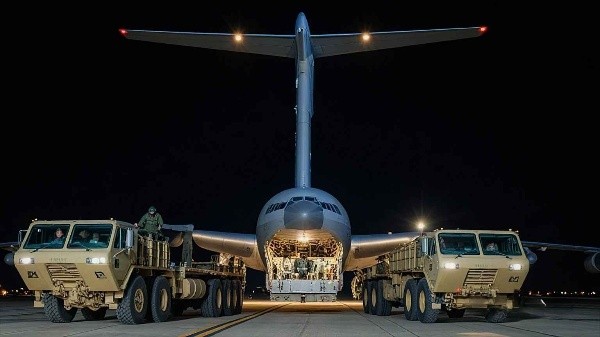Iran’s Plan to Strike Back Against the U.S.
Iran’s Military Preparations Following U.S. Attacks
Loading...

American forces will be sent to operate a missile defense battery ahead of a likely Israeli attack on Iran
Pentagon Confirms Deployment of THAAD Missile Defense System
In a significant escalation of military involvement in the Middle East, the Pentagon has announced the deployment of a Terminal High Altitude Area Defense (THAAD) system to Israel. This move, confirmed by Pentagon Press Secretary Maj. Gen. Pat Ryder, includes the dispatch of American service members tasked with operating the missile defense system. Notably, this marks the first time US combat troops have been stationed in Israel since the onset of the Israel-Hamas conflict last year.
A Strategic Response to Iranian Aggression
According to Ryder, the THAAD battery and its accompanying personnel are intended to enhance Israel's air defense capabilities in the wake of recent Iranian missile strikes. These attacks, which occurred on April 13 and again on October 1, have raised alarms in both Israel and the United States. President Joe Biden, who previously indicated a reluctance to deploy American troops in combat situations, has authorized this deployment amid escalating tensions.
The THAAD system is designed to intercept ballistic missiles during their descent, using a non-explosive projectile launched at speeds reaching eight times the speed of sound. A single THAAD battery comprises 95 soldiers and is equipped with six truck-mounted launchers capable of firing up to 48 interceptors, making it a formidable addition to Israel's defense arsenal.
Historical Context and Previous Deployments
The US has a history of deploying THAAD systems in the region, having previously stationed one in Saudi Arabia following the outbreak of the Israel-Hamas war last October. In 2019, a THAAD battery was also deployed to Israel for training exercises. However, since the current conflict escalated, this is the first time both the system and the American troops who operate it have been sent to Israel, highlighting the urgent need for enhanced defense measures.
While American forces participated in a brief humanitarian mission off the coast of Gaza earlier this year, they did not engage directly within the Palestinian territories, maintaining a degree of operational distance amid the ongoing conflict.
Iran's Threats and Israel's Potential Response
The announcement of US troop deployment comes in the shadow of a significant Iranian missile attack on October 1, which involved approximately 200 ballistic missiles targeting Israeli military installations. Iran claims this attack was a legitimate response to Israel's actions, including the assassination of key figures associated with Hamas and Hezbollah.
In light of these events, Israel is widely anticipated to retaliate against Iranian interests, potentially targeting oil or nuclear infrastructure. However, the US has urged caution, advising Israel against such actions, which could escalate the already volatile situation.
Iran has warned that any Israeli provocation will elicit a strong response. A source within Tehran indicated that retaliation would be proportional, signaling that strikes on Iranian oil facilities would be met with attacks on Israeli refineries, and similar responses would apply to other critical infrastructure.
Rising Concerns Over Troop Safety
Just hours before the Pentagon's announcement, Iranian Foreign Minister Seyed Abbas Araghchi expressed grave concerns regarding the safety of US troops deployed to operate the THAAD system in Israel. He emphasized that while efforts are underway to de-escalate the situation in the region, Iran remains unwavering in its commitment to defend its interests.
As tensions continue to mount, the deployment of US troops marks a critical juncture in the US-Israel relationship, with potential implications for regional stability and future military engagements.
Editor
Iran’s Military Preparations Following U.S. Attacks
Troops remain in five strategic locations, raising fears of renewed tensions and long-term occupation.
Opposition forces have taken control of the capital after a significant offensive. Here is how it unravelled.
